Recently, we’ve seen a rise in advertisements talking about gender, race, women’s rights, menstruation, and other social issues. However, it’s not uncommon for these ads to stir up controversy online for their treatment of these social issues. In this changing ad world, haru., Chief Producer of content production and artist management company HUG, worked on a KAI Corporation ad for razors that tackled the topic of “unwanted hair.” She came up with the tagline, “You decide whether hair is unwanted.” TOKION asked her about her thoughts on the messages that we’ve recently seen in advertising.
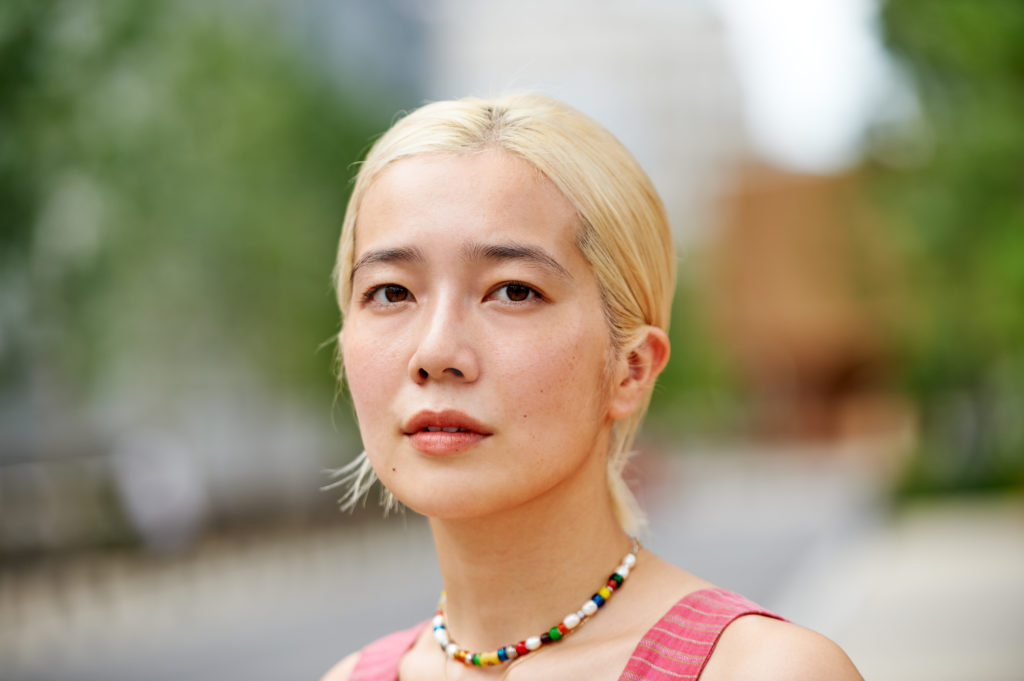
Gender and politics are unavoidable parts of life
――You’ve been talking about topics surrounding politics and gender since your time working on HIGH(er) magazine, while you were still a student at Tokyo University of the Arts.
haru.: I lived in Germany when I was in high school, where I was considered a complete foreigner. And at first, I couldn’t really communicate well with the people around me. I made a zine with the desire to be understood by the people around me, and that led to HIGH(er) magazine. Basically, I find people themselves more interesting than topics.
For example, with HIGH(er) magazine, we’ve talked to the editors and distributors of “BIG ISSUE,” and covered topics related to sex, gender, and women’s bodies. We aren’t trying to claim that we’re going to solve all kinds of issues, but we want to tell the real stories of people who are affected by these issues. It’s important to look at numbers and statistics, of course, but I think hearing individual stories can reveal new perspectives. I’m really grateful to all the people who’ve shared their stories for our magazine so far. I don’t know how they feel, but I think when they share their stories, they’re also sharing a little bit of their world with us. I think that’s really amazing.
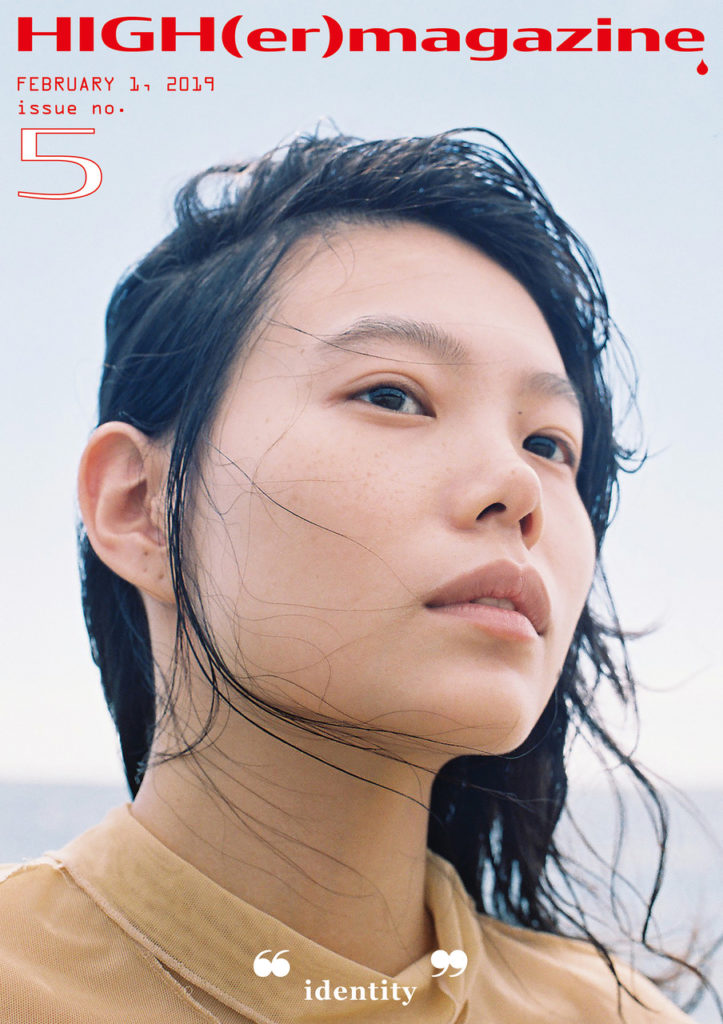
1 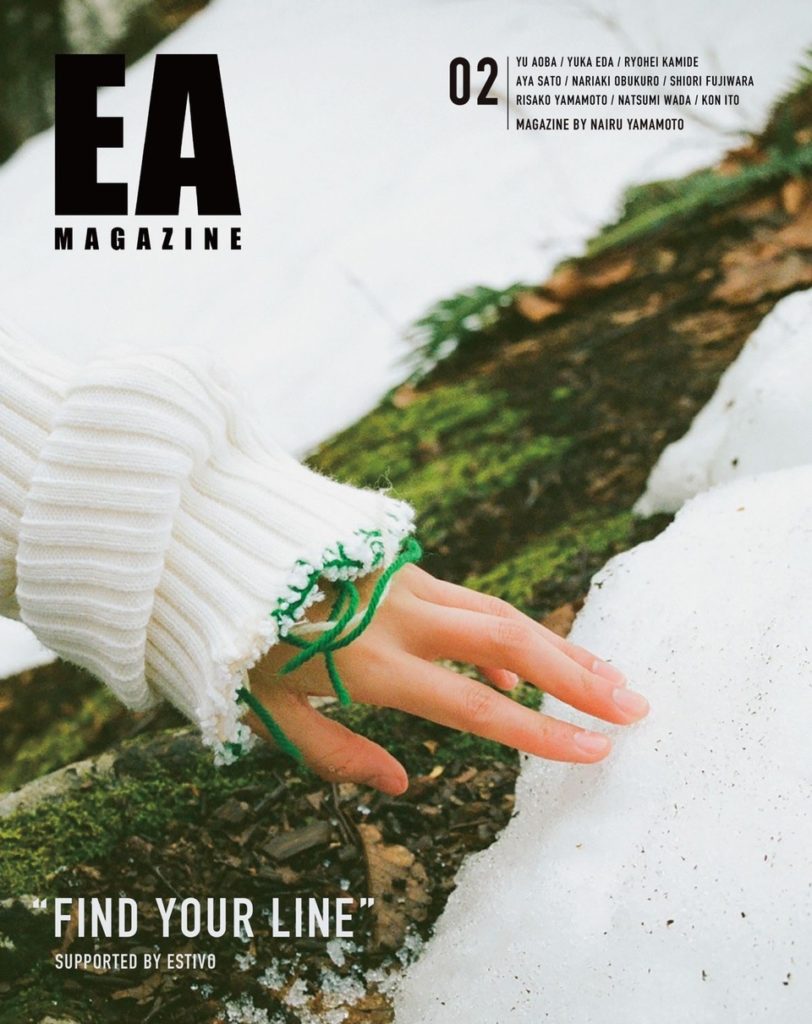
2
――What’s the story behind starting your company, HUG, last June?
haru.: My parents suggested that I go to grad school, so I applied for the sake of it, but they saw right through me in the interviews and I didn’t get in. When I was trying to figure out what to do, I had the idea to start a company where I could do what I had already been doing by myself, but with friends. That’s how it started.
We mainly do content production and artist management, but lately we’ve also started producing and selling “self-love” goods online, including a rice subscription service “Masshiro,” shea butter “EASY CARE BUTTER,” and loungewear “Rainbow Gowns.”
――What’s the concept behind each product?
haru.: The proceeds of EASY CARE BUTTER go to women workers in the West African country of Burkina Faso. I bought shea butter for the first time about two years ago from someone who had worked for an organization in Burkina Faso, and it was really good. There are so many cosmetic products in the world that it’s hard to even choose one, but with this single product, you can take care of your face, body, and even your hair. And rather than randomly picking a cosmetic, this product actually gives back to the women who produce it.
The Rainbow Gowns were produced in Japan, and they were pure white. They looked a bit plain, so we tie-dyed them ourselves. (laughs) And then with the rice subscription service, we got the idea because one of our signed artists’ family has a rice shop. We started talking about how heavy and difficult it is to buy rice, so we offer two kinds of rice: One chewy rice that goes well with strong flavors, and another that tastes good even if it’s cold. We send those out on a subscription basis.
On growing up in an environment where “your decisions are your own business.”
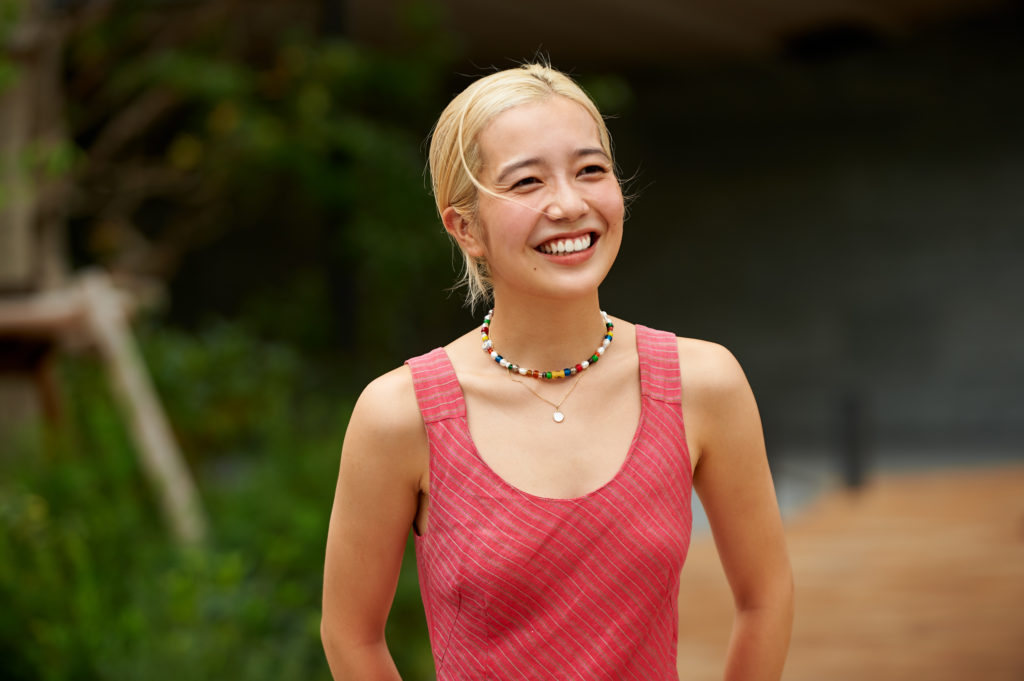
――I feel like you’ve stood out since you were a kid. Is that the result of the environment you were raised in?
haru.: My family believes that basically, your decisions are your own business. For example, for middle school graduation, it’s common for parents to attend. But in my case, my parents told me, “This is your graduation, so you should enjoy it yourself.” and sent me off at the door. I lived away from them in high school, too, but we really didn’t keep in frequent contact. My parents don’t really heavily scold or praise me, but they also never reject who I am as a person. I think that’s been a huge support for me.
――When you lived in Germany as a high schooler, did you feel there were any differences from Japan?
haru.: I spent two and a half years of elementary school as well as four years of high school in Germany at a Waldorf school.* They put a lot of emphasis on classes that cultivate intuitive skills, like music and art, and there were no report cards. There was really a great sense of being accepted and seen. So I was really surprised at how different it was compared to Japanese schools, where you’re always being told that this and that are wrong. The school uniforms also felt really constrictive. I’d loved fashion since middle school, so I wondered when I’d be able to refine my tastes.
*Waldorf education: Also known as “Steiner education.” A curriculum that respects the individuality of each student and aims to bring out the best in their abilities. The first of these schools was built in Germany.
——Are there differences between Japan and Germany in terms of ideas around gender?
haru.: In Germany, I was a foreigner, so that was my identity first and foremost. My gender and what people thought of me came after that. I spent a lot of time just wanting to be recognized as a human being in the first place. But I think when I was attending middle school in Japan, I was really trying to be popular. I guess it seemed a bit easier.
In the first place, Japan and Germany have a completely different standard for what’s desirable in women. In Germany, it’s considered sexy to stand out, be intellectual, and voice your opinions clearly. Going back and forth between Germany and Japan, I didn’t really fit either standard, so when I came back to Japan for university, I was determined to prove that it’s okay to just be yourself.
――In Japan, there’s a lot of pressure to be stereotypically “feminine.” Did this make you feel uncomfortable?
haru.: In middle school, I lived in the countryside of Saitama without internet or social media, so my hometown’s TSUTAYA [a Japanese bookstore/video rental chain] was the only place where I could access other worlds. I would browse through the latest fashion magazines there, thinking, “this is what it looks like to be more advanced” and unconsciously, I was trying to fit the media’s image of an “ideal” girl. I was shocked when I realized that later.
When I came back to Japan for university, the ads on the train tell us to get laser hair removal, and when I was interviewed, I’d get comments like, “If you’re going to call yourself a feminist, then don’t show off your chest so much.” I was really surprised. Recently, more people around me have been talking about marriage. Society portrays marriage as the image of happiness, but in reality, it’s very expensive, same-sex marriage isn’t recognized, couples can’t have separate surnames, and there are a lot of issues. There are too many inexplicable systems in place that make you wonder, “Who even thinks this is a good idea?”
Are there any “real people” in controversial ads?
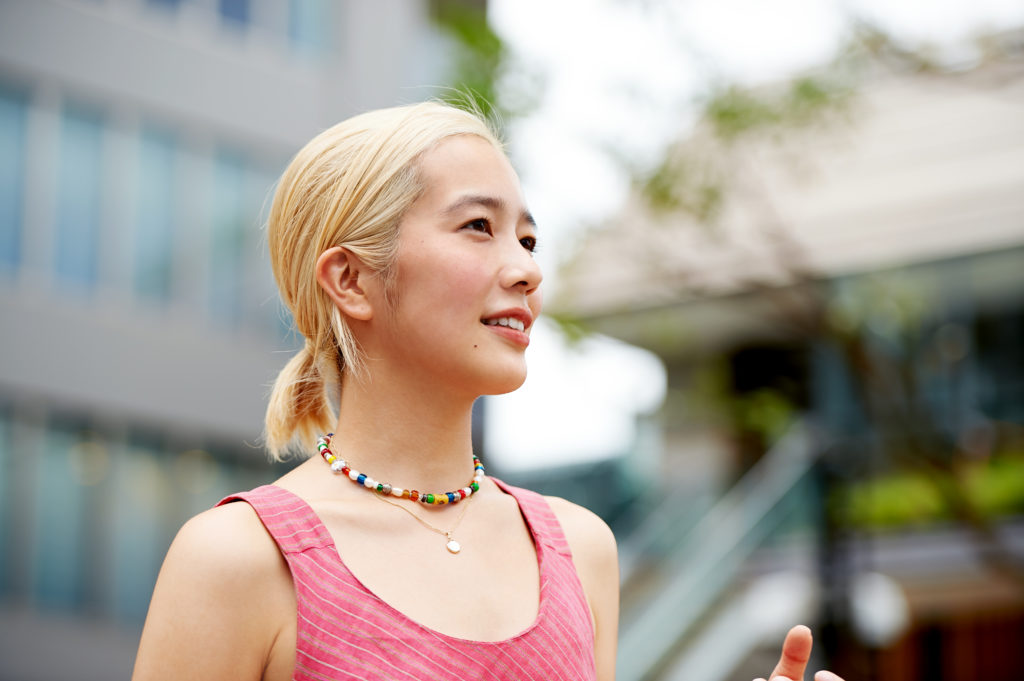
――The tagline used in Kai Corp’s razor ad became a hot topic.
haru.: I wrote the copy, “You decide whether hair is ‘unwanted.’” during the creation of EYESCREAM and KAI Corporation’s original booklet, and then KAI Corp. used it again for an advertisement after that. I wasn’t involved in making the corporate advertisement, but I was a bit uncomfortable with the final creative output. It used a CG model, which you can add hair to instantly, and doesn’t require the hardship or struggle that comes with “unwanted hair.” But I suppose if this ad is imagining the kind of person who should exist in the future, CG was a good choice. In any case, I think it’s very meaningful that a major corporation like KAI Corp. could send out this kind of message.
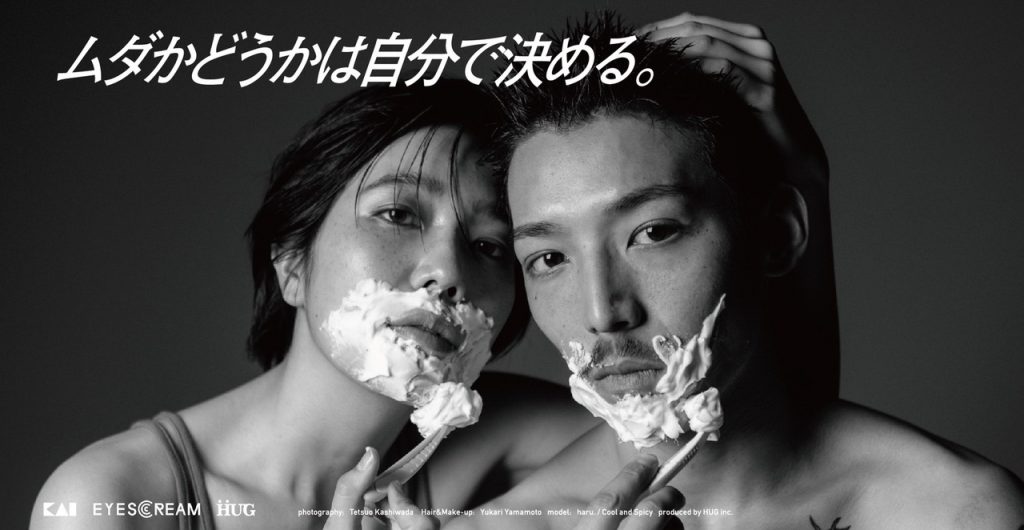
1 
2
――How do you think advertising should deliver messages?
haru.: I think advertising is something that comes from communication between people. But I often feel that within the advertising industry, it’s not uncommon for people to just skim the surface and take advantage of trends.
Recently, there have been ads that stir up a lot of criticism, but I think some of this criticism can be healthy. There was this one Korean period product commercial that I liked. It was about how periods are hard and can make you not want to do anything, and that’s fine. There’s no need to try and act cheery when things are rough. Even if they made a similar ad in Japan and it stirred up criticism, for example, it could give people a real understanding of the effects menstruation has on the body, and it speaks to the real experience of women. But a lot of ads just skim the surface of an issue and package it into something pretty. I think the most dangerous thing is when the people making these ads don’t truly understand the problem and are just pretending they do. I try to be careful about this too.
――Whether it’s ads, media, or the world in general, people like to create categories.
haru.: I also get lumped into the “female entrepreneur” category, and I don’t feel any type of way about it, but I personally think I’m just haru. I don’t know that much about business, so it’s sort of funny that the people around me have labeled me an entrepreneur. So I play games, like, how casual can I be in a formal setting?
When I gave a speech at WAW! (World Assembly for Women), it was a pretty formal event, but I wore a t-shirt that my friend made me. It was a t-shirt with a graphic of a hand giving the middle finger, and it said, “and u?” (laughs). Things like that are funny to me. Even if I’m called an entrepreneur, I try to play and stay outside the box.
――Playing outside of the box seems quintessentially haru.
haru.: I want to become everything. I’ve loved K-Pop since I was in middle school, so I’ve thought stuff like, I want to be signed to JYP! Or recently, I’ve been paragliding, so I’ve thought about continuing to learn and becoming a paragliding teacher. It’s fun to imagine other paths you could take in life. It’s easy to think that you only have one option in life, but a lot of the time that isn’t true.
Creating “social sculptures” through small changes
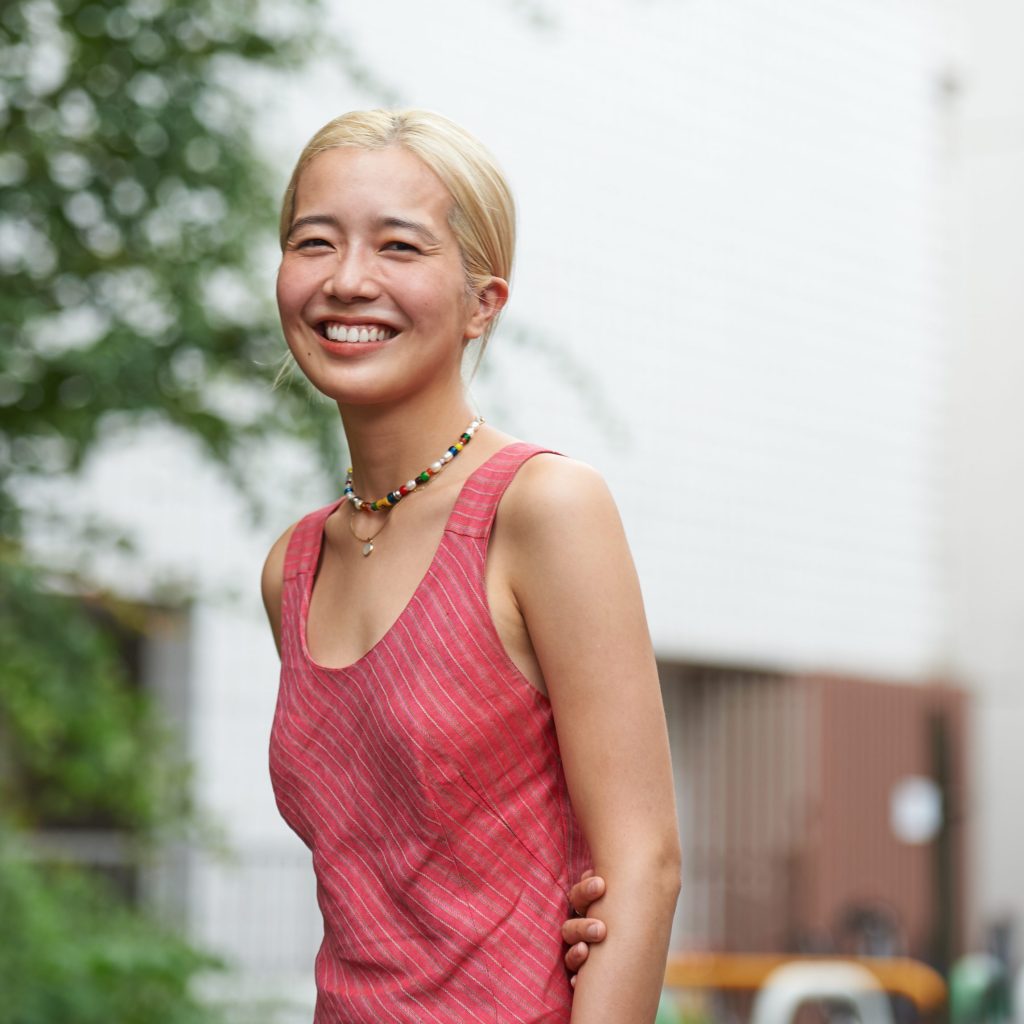
――When you started HUG, you said that you wanted to create “social sculptures.”
haru.: The phrase “social sculpture” is originally from modern artist Joseph Beuys. At the moment, the members of HUG all do a bunch of different things, but I call them all artists. Everything they create or are part of is connected to society, and all of us are individuals who are shaping society. “Social sculpture” is a slogan so we don’t forget that fact.
Even with a single word, it’s possible to have an effect on the people around us. I don’t like the Japanese words for “husband” (danna) and “wife” (okusan). * I think your relationship and communication with your partner changes depending on whether you use these words without thinking about them or whether you consciously choose to refer to them as your “partner” instead. The chain of micro-relationships, from the level of “you and I,” creates a community. It’s not that I want to do something big, but rather, I want to be a “social sculptor” at a personal level through my attitude and language.
*The commonly used Japanese words for husband, “danna” and wife, “okusan,” are often criticized for reinforcing gender stereotypes. “Danna” can also mean “master,” while “okusan” has kanji meaning “in the back of the house.”
――How do you actually create “social sculptures”?
haru.: At HUG, there’s a chopper-riding duo called “Cool and Spicy” (Yugo Ooki & Takuya Uchida). We went to the same elementary and middle school, and they were those kinds of little punks who would make fun of girls like, “You have armpit hair!” But those two modeled for the EYESCREAM and Kai Corp booklet that I mentioned earlier. After they thought about the message, “You decide whether hair is unwanted,” it was such a refreshing experience to be able to talk to them about how they have had unrealistic ideals about girls that don’t even exist, and how shaving your hair should be your own choice regardless of your gender.
Change takes a lot of time. It’s hard to change someone’s mind with just one ad. In fact, the stereotypes that we carry with us have been built up over a long period of time.
But that’s why it’s important to me to value people’s trust, and not to betray it. It’s not about suddenly saying something radical. It’s about continuously discussing what we want the world to look like at every turn. I think the way we interact with the people around us on a daily basis will affect our future.
haru.
haru. is Chief Producer of HUG Inc. Born in 1995, she entered Tokyo University of the Arts in 2015 and launched HIGH(er) magazine in the same year. There, she was involved in planning, editing, and production with the concept of “creating a space for people of the same generation to think together.” In June 2019, after graduating from college, she founded HUG inc. and became the director. With 45,000 followers on Instagram, she’s garnered a large following, especially among young people.
https://h-u-g.co.jp
Instagram:@hahaharu777
Photography Yusuke Abe(YARD)
Translation Aya Apton






